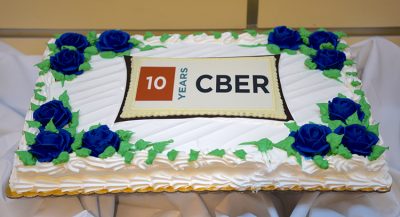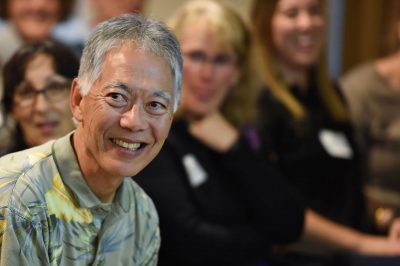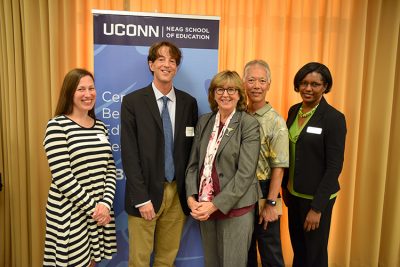 The year 2016 officially marks a 10-year milestone in the history of UConn’s Center for Behavioral Education and Research (CBER) — a Center based at the Neag School that has, over the course of merely a decade, secured millions of dollars in federal and state grants and contracts; conducted hundreds of innovative research projects; and enriched the lives of many thousands of educators and students around the world.
The year 2016 officially marks a 10-year milestone in the history of UConn’s Center for Behavioral Education and Research (CBER) — a Center based at the Neag School that has, over the course of merely a decade, secured millions of dollars in federal and state grants and contracts; conducted hundreds of innovative research projects; and enriched the lives of many thousands of educators and students around the world.
This past October, CBER’s leaders, researchers, and regional partners gathered with Neag School faculty, staff, students, and alumni on the UConn Storrs campus to celebrate the Center’s 10-year anniversary and the accomplishments of its founding director, Neag School Professor George Sugai.

Led since its inception by Sugai, a national leader in the field of special education, CBER was approved by the UConn Board of Trustees in 2006 and set out with the following mission: to promote equity and improve educational outcomes for all learners, especially those with, or at risk for, learning and behavioral difficulties. Ever since, Sugai has been working with CBER research scientists to ensure that the Center fulfills this mission while continuing to grow strategically over time, focusing research efforts in four key areas: literacy; positive behavior supports; behavioral health and school climate; and transition and postsecondary education.
“CBER has had a very clear mission from the beginning,” says Brandi Simonsen, associate professor of special education and now CBER co-director with fellow Neag School faculty member, Professor Michael Coyne. “We have a strong commitment to rigorous research.”
But the Center’s success, she adds, has always relied on more than carrying out research studies. “Something that makes us different, or something that we value heavily, is not just doing rigorous research, but really translating and making it usable. So that translation, dissemination piece has been a huge value in terms of the work that we do.”
“CBER is about academic success and behavioral success,” Sugai says. “You can’t do one without the other.”
CBER’s 10-Year Impact
October’s anniversary celebration event featured a reception preceded by remarks not only from Center co-directors Simonsen and Coyne, but also Neag School Dean Gladis Kersaint; Sugai; and guest Edward Kame’enui, professor of education at the University of Oregon’s College of Education, each of whom highlighted the Center’s significant achievements.
“I think it was a great tribute to George and the impact he’s had at CBER and beyond,” says Neag School alumna Marlena Minkos ’16 Ph.D., a former CBER graduate assistant.
With 12 Neag School faculty members currently partnering as CBER research scientists, CBER has a wealth of accomplishments to celebrate.
CBER’s goal, Simonsen shared at the event, is to create a more equitable environment for all students in order to level the playing field, and also to provide differentiated supports for kids who need it. In addition, she said, CBER works to represent and serve the Neag School and UConn communities, the broader community, and the world. In fact, over the past year alone, Sugai has visited 17 countries as a representative of CBER; Simonsen and Coyne are looking to continue that international growth.

“As Mike Coyne and I look toward the next 10 years, we are excited to continue to enhance the contributions of CBER within the Neag School of Education, at UConn, and in local, national, and international communities,” Simonsen says.
Among the accomplishments highlighted by the event’s various featured speakers is the Center’s extensive research impact over the past 10 years: CBER faculty members have secured $40 million in federal and state grants and contracts in their four areas of focus — representing more than $550,000 per faculty member per year. This research has resulted in 437 peer-reviewed journal articles, books, and chapters, the equivalent of five publications per CBER faculty member per year.
“It’s really remarkable that in a period of 10 years or so that you’ve had this kind of impact already,” says Kame’enui of the University of Oregon. “For someone who’s had the privilege of working at both the state and federal level, this is pretty impressive.”
In addition to its publications, CBER has been successful in broad public engagement. Its faculty have actively partnered locally, with 65 school districts across the state of Connecticut, as well as nationally and internationally with educators, communities, and nonprofit agencies of all kinds, touching schools in all 50 states and 14 countries. Sugai’s work with the PBIS Center has meanwhile impacted more than 23,000 schools in the U.S. alone.
“For CBER, 10 years in institutional life is not that long,” says Neag School doctoral student Eleanor Maddock. “There are institutions that are hundreds of years old and what CBER has accomplished in just 10 years is significant and meaningful.”
“With CBER, George and his colleagues have shaped, from the ground up, a Center that is making positive, real-world impact that truly translates research into practice into valuable public service that continues to grow over time,” Dean Kersaint shared during her remarks.
CBER research scientists have also mentored more than 60 doctoral research assistants and supported 13 postdoctoral-level researchers, and have been awarded research grants of more than $2.5 million to support and prepare these aspiring researchers.
“The last 10 years of work serves an excellent foundation for the next 10,” Sugai says. “I’m confident that under Mike and Brandi’s leadership, and with the strength of our research scientists, CBER will continue to lead UConn, Connecticut, and the nation in high-quality research and implementation, with a relentless focus on improving learning outcomes for our children and youth.”
View photos from the CBER 10-Year Anniversary Celebration here. Learn more about CBER at cber.uconn.edu, or access highlights from the Center’s past decade of work here.
 Facebook
Facebook
 Twitter
Twitter
 LinkedIn
LinkedIn
